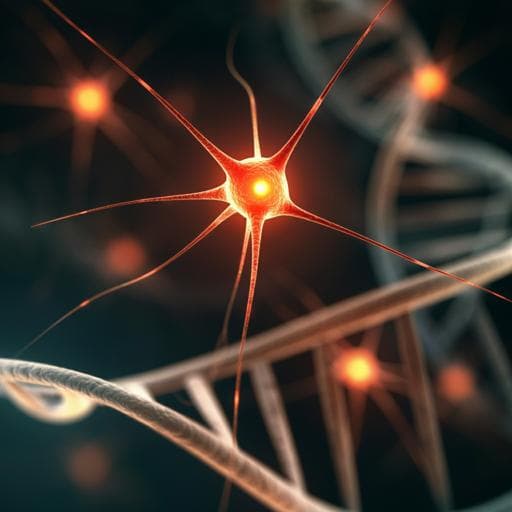
Psychology
Fear memory regulation by the cAMP signaling pathway as an index of reexperiencing symptoms in posttraumatic stress disorder
H. Hori, H. Fukushima, et al.
PTSD has an estimated lifetime prevalence of ~3.9% and is characterized by reexperiencing, avoidance, and hyperarousal, with reexperiencing being largely unique to PTSD. Because reexperiencing reflects involuntary retrieval of traumatic memories, fear learning and memory mechanisms are implicated. Genetic and environmental factors contribute to PTSD etiology. Prior human genetic associations implicate PACAP, ADCYAP1R1 (PAC1 receptor), and CRHR1, all of which activate the cAMP signaling pathway, suggesting cAMP may influence PTSD pathogenesis, particularly intrusive reexperiencing. Memory retrieval destabilizes consolidated memories and triggers reconsolidation, a gene expression-dependent process. Rodent work suggests cAMP signaling facilitates retrieval and subsequent memory processes. The study tests the hypothesis that cAMP signaling state determines fear memory retrieval and maintenance and correlates with reexperiencing symptoms. The authors combine mouse pharmacologic and optogenetic manipulations with integrative mouse hippocampal and human blood transcriptomics, followed by co-expression and DNA methylation analyses focused on key genes such as PDE4B.
Background work establishes that fear memory formation and reconsolidation require gene expression and involve cAMP-PKA-CREB signaling. Prior studies show PACAP/PAC1 and CRHR1 associate with PTSD symptoms, particularly in females, and activate cAMP signaling. Memory retrieval renders memories labile, with reconsolidation strengthening or updating them. cAMP activation promotes retrieval via PKA-mediated GluA1 phosphorylation and enhances consolidation/reconsolidation; conversely, inhibition impairs these processes. Genome-wide studies have identified CRHR1 for reexperiencing and listed PDE4B as a significant locus in PTSD. Prior rodent studies demonstrate that inhibitory avoidance memory can be strengthened by retrieval (reconsolidation), and that optogenetic control of cAMP and pharmacologic PDE4 inhibition (rolipram) enhance synaptic plasticity and memory. The literature also notes partial concordance between blood and brain transcriptomes and crosstalk between cAMP and MAPK pathways, including EPAC-RAP1 signaling relevant to memory.
Mouse study: Male C57BL/6N mice (n=225 total) were housed under standard conditions. Hippocampus-dependent fear memory was probed using contextual fear conditioning and inhibitory avoidance (IA) tasks. Pharmacology: To increase cAMP signaling, rolipram (ROL; PDE4 inhibitor) was injected systemically (0.1 mg/kg, 30 min before retrieval). To decrease cAMP, NB001 (adenylyl cyclase 1 inhibitor) was injected systemically (30 mg/kg twice, hourly, starting 2 h before retrieval). Behavioral paradigms included training with footshock, followed by re-exposure (retrieval) and test sessions at defined intervals, with freezing (contextual) or crossover latency (IA) measured by blinded experimenters. Optogenetics: AAV vectors were micro-infused into dorsal hippocampus under a CaMKII promoter to express either bPAC (photoactivatable adenylyl cyclase; AAV9-CaMKII-mGFP-bPAC) to raise cAMP or LAPD (light-activated phosphodiesterase; AAV9-CK0.4-LAPD-GFP) to lower cAMP; GFP controls were included. Blue light (473 nm, 4 Hz, 15 ms pulse width, 30 min) was delivered starting 40 min before retrieval. pCREB (Ser133) levels in CA1 were measured 30 min after stimulation to confirm modulation of cAMP-PKA signaling. Transcriptomics: Dorsal hippocampus RNA was collected 30 min after IA retrieval (reactivated) or from non-reactivated trained controls; RNA-seq was performed to identify differentially expressed genes. qRT-PCR validated select genes (c-fos, Pde4b, Rap1a, Nkap) in hippocampus and peripheral blood at 30 and 90 min post-retrieval. Statistics included one- and two-way ANOVA with Bonferroni or Newman–Keuls post hoc tests, paired and unpaired t-tests. Human study: Participants were 32 civilian female PTSD patients and 16 female healthy controls (ages 21–59, all Japanese). PTSD diagnosis was confirmed with the Japanese PDS; symptom severity assessed with IES-R (intrusion/reexperiencing, avoidance, hyperarousal). Exclusions included schizophrenia and marked manic episodes. Most patients were on psychotropics. Blood sampling occurred before lunch (11:30–12:30) for RNA and DNA. Transcriptome profiling used Agilent SurePrint G3 v3 8×60K microarrays with thresholding, log2 transform, 75th percentile shift normalization, and baseline transformation; data deposited as GSE199841. DNA methylation was assayed via Illumina MethylationEPIC BeadChip; analysis focused on CpG sites within PDE4B. Data analysis: Pearson correlations (and Spearman where necessary) tested associations between gene expression and reexperiencing severity; t-tests compared patients vs controls. Integrative analysis matched 16,721 genes common to human and mouse datasets, applying thresholds (human: |r|>0.40; mouse: FDR q<0.001 and |fold change|>1.36) to identify overlapping, directionally consistent genes; further filtered by case-control differential expression (p<0.05). Mediation analysis tested whether PDE4B methylation (cg14227435) affected reexperiencing via PDE4B mRNA expression.
- In mice, increasing cAMP signaling enhanced fear memory retrieval and maintenance, while decreasing cAMP impaired both: Rolipram (PDE4 inhibitor) before retrieval increased contextual freezing vs vehicle (two-way ANOVA drug effect F(1,38)=10.191, p<0.05); NB001 (AC1 inhibitor) reduced freezing (drug effect F(1,38)=13.317, p<0.05). In IA, rolipram increased crossover latency at re-exposure and test (drug F(1,36)=30.872, time F(1,36)=24.355, interaction F(1,36)=10.239, all p<0.05), while NB001 decreased it (drug F(1,36)=30.692, time F(1,36)=15.02, interaction F(1,36)=17.531, all p<0.05). - Optogenetics in dorsal hippocampus recapitulated pharmacology: bPAC activation (blue light) increased freezing at re-exposure and test vs GFP and no-stim controls (group F(2,58)=12.566, p<0.05); LAPD activation decreased freezing (group F(2,60)=10.825, p<0.05). pCREB levels increased with bPAC and decreased with LAPD after stimulation, confirming modulation of cAMP-PKA signaling. - Mouse hippocampal RNA-seq 30 min after IA retrieval identified robust transcriptional changes: 3997 upregulated and 3140 downregulated genes (|log2FC|>0.38, p<0.05). - Integrative human-mouse transcriptomics showed significant concordance: among 413 overlapping genes (meeting human correlation and mouse FDR thresholds), 78% had consistent direction; correlation between human reexperiencing-expression correlations and mouse retrieval fold-changes was strong (r=0.49, p=7.3×10^-26). - Fifteen genes overlapped across human reexperiencing correlation, mouse retrieval change, and human case-control difference. Notably, PDE4B was a key hit: expression negatively correlated with reexperiencing severity in PTSD patients (Pearson r=-0.455, p=0.010; Spearman ρ=-0.49, p=0.005), was downregulated after retrieval in mouse hippocampus (fold change ≈ -1.40, p<0.001), and was lower in patients vs controls (t-test p=0.031). - PDE4B expression correlated negatively with trait anxiety across the total sample (r=-0.381, p=0.008) but not with state anxiety or depressive symptoms. - Co-expression analysis identified 483 genes (|r|>0.6) with PDE4B; Gene Ontology enrichment highlighted MAPK-related terms, with RAP1A notably co-expressed and downregulated in both human reexperiencing and mouse retrieval. - Mouse qRT-PCR validated decreases in Pde4b, Rap1a, and Nkap in hippocampus 30 min after retrieval, alongside increased c-fos; blood Pde4b, Rap1a, and Nkap also decreased at 30 and/or 90 min post-retrieval, indicating brain-blood synchrony. - PDE4B DNA methylation: among 125 CpGs, five sites showed significant tripartite correlations with reexperiencing and PDE4B mRNA. At cg14227435 (putative enhancer), methylation correlated positively with PDE4B expression in patients (r=0.524, p=0.002) and negatively with reexperiencing severity (r=-0.384, p=0.033). Mediation analysis supported complete mediation: methylation → expression (estimate 3.86, SE 0.75, p<0.001), expression → reexperiencing (estimate -8.54, SE 4.17, p=0.040), methylation → reexperiencing nonsignificant; indirect effect significant (estimate -0.21, SE 0.11, p=0.049).
The findings support the central hypothesis that cAMP signaling state determines fear memory retrieval and its subsequent maintenance, implicating this pathway in PTSD reexperiencing. Pharmacological and optogenetic upregulation of cAMP enhanced retrieval and reconsolidation-linked maintenance, consistent with cAMP-PKA-CREB mechanisms that promote memory processes; downregulation produced the opposite effects. Integrative cross-species transcriptomics linked human reexperiencing severity with mouse retrieval-associated gene expression, with significant directional concordance, validating the translational approach. PDE4B emerged as a convergent node: lower PDE4B (a cAMP-degrading enzyme) associates with more severe reexperiencing in patients and is acutely decreased after retrieval in mouse hippocampus and blood, suggesting that reduced PDE4B elevates cAMP tone to facilitate retrieval and strengthening of traumatic memories. Brain-blood synchrony of Pde4b and related transcripts after retrieval in mice, together with human blood findings, suggests peripheral measures may index central processes. Co-expression and GO analyses implicate crosstalk with MAPK pathways, with RAP1A/EPAC signaling potentially contributing to retrieval mechanisms. The mediation by PDE4B enhancer methylation (cg14227435) indicates an epigenetic mechanism modulating PDE4B expression and, indirectly, reexperiencing severity. Overall, enhanced cAMP signaling via PDE4B downregulation may be a mechanistic underpinning of reexperiencing, offering a functional biomarker and potential therapeutic target.
This study demonstrates that elevating cAMP signaling facilitates, and reducing it impairs, the retrieval and maintenance of hippocampus-dependent fear memories in mice. Cross-species transcriptomics identified PDE4B as a key gene downregulated in mouse hippocampus after retrieval and in the blood of PTSD patients with more severe reexperiencing, with brain-blood synchrony observed in mice. In patients, PDE4B enhancer methylation correlated with expression and mediated its association with reexperiencing severity. These findings suggest that increased cAMP levels, driven by reduced PDE4B expression, enhance traumatic memory retrieval and contribute to reexperiencing symptoms in PTSD. Future research should examine PDE4B expression and cAMP signaling directly in the brains of PTSD patients, assess sex generalizability, and evaluate whether modulating PDE4B/cAMP-EPAC/PKA pathways can therapeutically mitigate reexperiencing without impairing other cognitive functions.
- Human sample size was modest, potentially limiting power and generalizability. - Human participants were exclusively female, so sex-specificity vs generalizability to males remains unresolved. - Mouse experiments focused on fear-based tasks; effects on other memory modalities or broader cognition were not assessed. - Peripheral blood was used for human transcriptomics; while mouse data suggest brain-blood synchrony, direct human brain validation is lacking. - Many patients were on psychotropic medications, which could influence blood gene expression.
Related Publications
Explore these studies to deepen your understanding of the subject.







